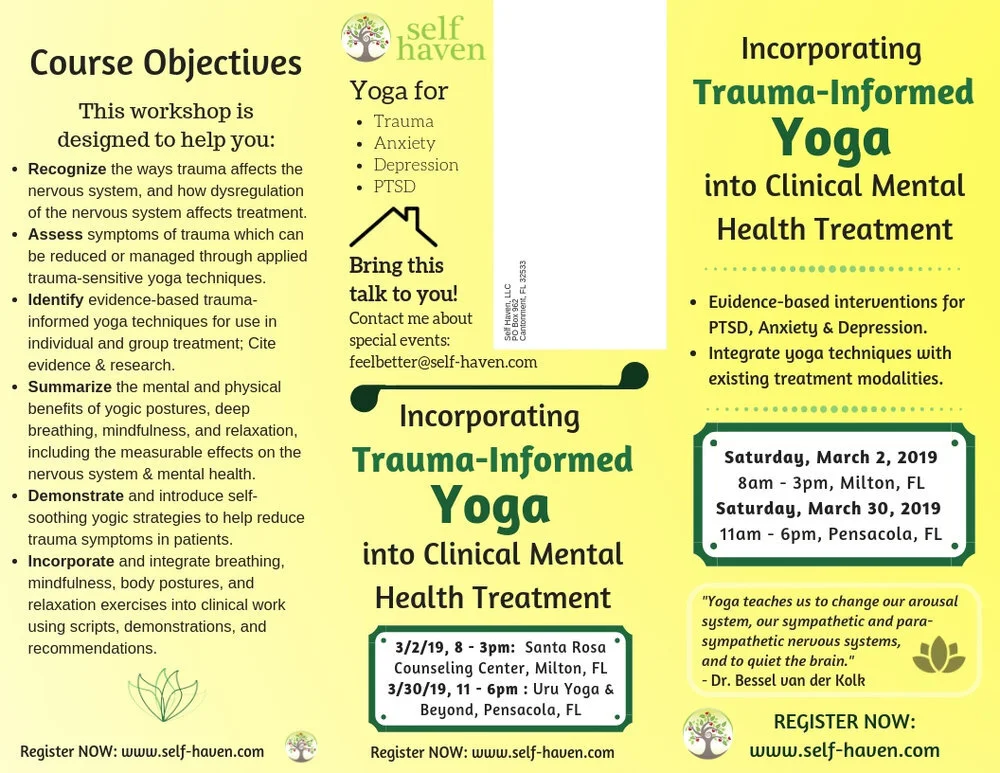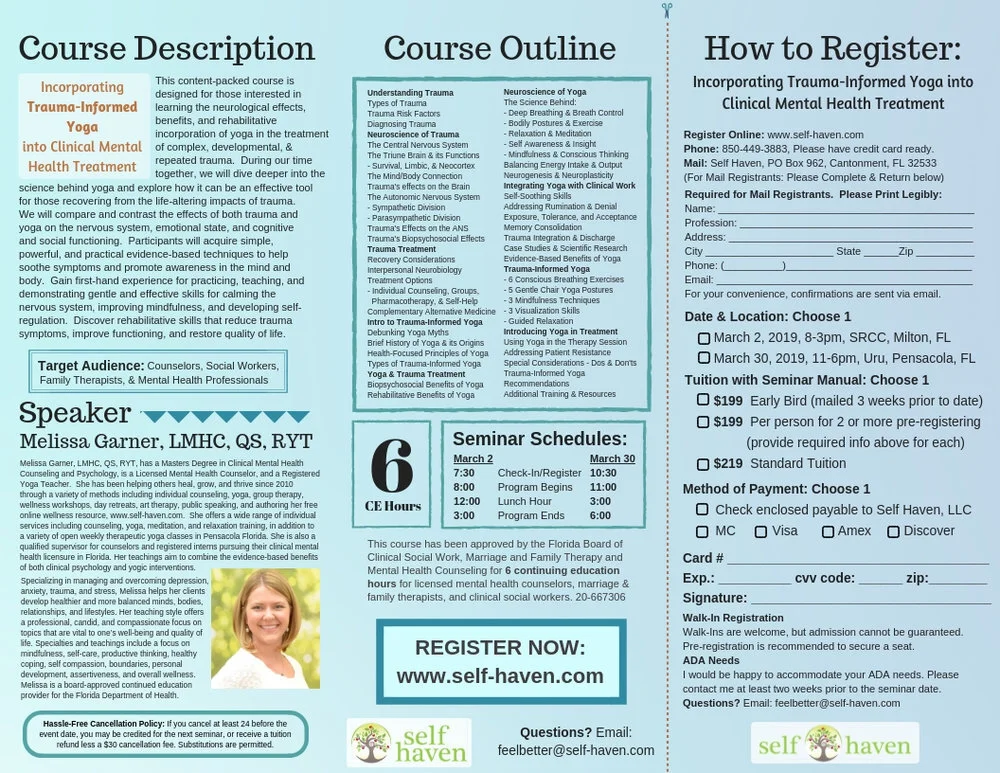Self Study: Incorporating Trauma-Informed Yoga into Clinical Mental Health Treatment
Self Study: Incorporating Trauma-Informed Yoga into Clinical Mental Health Treatment
*This course has been approved by the Florida Board of Licensed Mental Health Counselors, Social Workers, and Marriage and Family Therapists, as well as with Yoga Alliance for 6 continued education non-contact hours; CE Provider 50-22677, Course 20-772384, YACEP 193605.
LMHC, LMFT, and LCSWs licensed in Florida can take this course directly on CEBroker’s website for easy viewing and immediate CE reporting! Click here to be redirected to take the course on CEBroker.com.
This content-packed home study course is designed for those interested in learning the neurological, physiological, and rehabilitative benefits of the incorporation of yoga in clinical mental health treatment for complex, developmental, and repeated trauma.
We will look at the science behind yoga and explore how it can be an effective tool for those recovering from the life-altering impacts of trauma. We will compare and contrast the effects of both trauma and yoga on the nervous system, emotions, thought habits, and social functioning. Participants will learn simple, practical, and powerful evidence-based techniques to help soothe symptoms and promote awareness in the mind and body.
You can expect to walk away with first-hand experience at practicing, teaching, and demonstrating a variety of gentle and effective skills for calming the nervous system, improving mindfulness, and developing self-regulation.
The course format is presented as a 152 page .pfd slideshow with text, images, info-graphics, video links, and resources.
Course Objectives:
This home-study course is designed to help you:
Recognize the ways trauma affects the nervous system, and how dysregulation of the nervous system affects treatment.
Assess symptoms of trauma which can be reduced or managed through applied trauma-sensitive yoga techniques.
Identify evidence-based trauma-informed yoga techniques for use in individual and group treatment; Cite evidence & research.
Summarize the mental and physical benefits of yogic postures, deep breathing, mindfulness, and relaxation, including the measurable effects on the nervous system & mental health.
Demonstrate and introduce self-soothing yogic strategies to help reduce trauma symptoms in patients.
Incorporate and integrate breathing, mindfulness, body postures, and relaxation exercises into clinical work using scripts, demonstrations, and recommendations.
Learn evidence based interventions for PTSD, Anxiety, & Depression
Integrate yoga techniques with existing treatment modalities
Course Outline:
Understanding Trauma
Types of Trauma
Trauma Risk Factors
Diagnosing Trauma
Neuroscience of Trauma
The Central Nervous System
The Triune Brain & its Functions
- Survival, Limbic, & Neocortex
The Mind/Body Connection
Trauma's effects on the Brain
The Autonomic Nervous System
- Sympathetic Division
- Parasympathetic Division
Trauma's Effects on the ANS
Trauma's Biopsychosocial Effects
Trauma Treatment
Recovery Considerations
Interpersonal Neurobiology
Treatment Options
- Individual Counseling, Groups, Pharmacotherapy, & Self-Help
Complementary Alternative Medicine
Intro to Trauma-Informed Yoga
Debunking Yoga Myths
Brief History of Yoga & its Origins
Health-Focused Principles of Yoga
Types of Trauma-Informed Yoga
Yoga & Trauma Treatment
Biopsychosocial Benefits of Yoga
Rehabilitative Benefits of Yoga
Neuroscience of Yoga
The Science Behind:
- Deep Breathing & Breath Control
- Bodily Postures & Exercise
- Relaxation & Meditation
- Self Awareness & Insight
- Mindfulness & Conscious Thinking
Balancing Energy Intake & Output
Neurogenesis & Neuroplasticity
Integrating Yoga with Clinical Work
Self-Soothing Skills
Addressing Rumination & Denial
Exposure, Tolerance, and Acceptance
Memory Consolidation
Trauma Integration & Discharge
Case Studies & Scientific Research
Evidence-Based Benefits of Yoga
Trauma-Informed Yoga
- 6 Conscious Breathing Exercises
- 5 Gentle Chair Yoga Postures
- 3 Mindfulness Techniques
- 3 Visualization Skills
- Guided Relaxation
Introducing Yoga in Treatment
Using Yoga in the Therapy Session
Addressing Patient Resistance
Special Considerations - Dos & Don'ts
Trauma-Informed Yoga Recommendations
Additional Training & Resources
About the Speaker:
Melissa Garner, LMHC, QS, RYT, has a Masters Degree in Clinical Mental Health Counseling and Psychology, is a Licensed Mental Health Counselor, and a Registered Yoga Teacher. She has been helping others heal, grow, and thrive since 2010 through a variety of methods including individual counseling, yoga, group therapy, pubilc workshops, day retreats, art therapy, public speaking, and authoring a free online wellness resource, www.self-haven.com. She offers a wide range of individual services including counseling, yoga, meditation, and relaxation training, in addition to a variety of open weekly therapeutic yoga classes in Pensacola Florida. She is also a qualified supervisor for counselors and registered interns pursuing their clinical mental health licensure in Florida. Her teachings aim to combine the evidence-based benefits of both clinical psychology and yogic interventions.
Specializing in managing and overcoming depression, anxiety, trauma, and stress, Melissa helps her clients develop healthier and more balanced minds, bodies, relationships, and lifestyles. Her teaching style offers a professional, candid, and compassionate focus on topics that are vital to one’s well-being and quality of life. Specialties, topics, and teachings include a focus on self awareness, mindfulness, self-care, productive thinking, healthy coping, self compassion, healthy boundaries, personal development, assertiveness, and overall wellness.
Informed Consent & Disclosure: Please note, while the course is open to anyone, it may not necessarily be appropriate for everyone. The subject matter of this course will at times involve extensive clinical discussion about trauma, its causes & effects, as well as case studies. Anyone who is experiencing present trauma symptoms including flashbacks, dissociation, or severe panic when reminded of a traumatic event, is encouraged to seek individual treatment prior to participating in the course.
Also, as is the case with any physical activity, the risk of injury, even serious or disabling, is always present and cannot be entirely eliminated. You are advised to first consult your physician prior to participating in yoga, especially if you have an injury, a medical illness, or have chronic pain. Please participate at your own comfort level. If you experience any pain or severe discomfort during our session, please listen to your body, discontinue the activity, and seek support. Participants assume all risks which could occur by reason of your participation, and agree to irrevocably release and waive any claims against Self Haven, LLC and Melissa Garner, LMHC, RYT.
Conflicts & Disputes:
In the event that a participant is dissatisfied, please submit a detailed written complaint within 30 days of the issue to feelbetter@self-haven.com for review. You may expect a reply within 30 days of your submission. Every effort will be made to ensure 100% satisfaction. Any dispute that remains unresolved will be handled through mediation, then if necessary, arbitration.
Course Intentions and Disclosure:
Please note that this course does not qualify an individual to diagnose, treat, or provide clinical mental health services to an individual. It was created for both yoga teachers’ and clinical mental health counselors’ continuing education. It was designed to bridge the gap between the two professions by educating yoga teachers about trauma, and trauma-counselors about yoga. It is this writer’s intention to bring more trauma-informed yoga teachers and yoga-informed counselors to the community.
Questions?
Email: feelbetter@self-haven.com or Call (850) 208-3543






